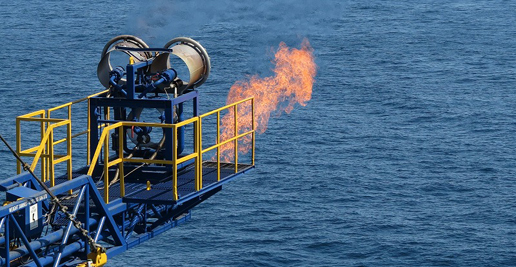Natural gasses are fast becoming a viable replacement for the conventional fossil fuels like coal and oil. While these natural gases are still burnt to create fuel, the levels of carbon emissions produced are significantly lower than fossil fuels.

In Japan, scientists and engineers have discovered a massive natural gas reserve deep in the ocean. This reserve will have a major impact on Japan, as this reserve is approximately 1.1tn cubic metres and is large enough to cover all energy requirements in the country for more than a decade. In fact, studies indicated that there is more methane gas in this reserve and is big enough to cover all energy requirements for nearly 100 years.
These gases are a type of frozen molecules of methane and water, and are commonly referred to as ‘Fire Ice’. The reason that these molecules are known as ‘Fire Ice’ is because they will only ignite in ice form.
What exactly is methane gas?
Methane gas is a colourless and odourless gas that is widely found around the world. In fact, this is the most common type of natural gas found on earth. Methane gas is composed of anaerobic bacterial decomposition of animal and plant matter, occurring under water, producing marsh gas – otherwise known as methane gas.
What are the uses of methane gas?
Natural gas is used to run utility power plants. This type of fuel has become popular for other uses due to clean burning nature and abundant supplies available. Furthermore, methane is able to run small scale generators and is the ideal way to reduce your carbon footprint.
For municipal landfills, methane is harnessed via pipelines that release biogas from the landfill and transport this to government facilities that will refine the waste and then use the refined waste product to generate electricity.
How do you extract methane gas?
Extracting methane gas is tricky, because each molecule is trapped in a water ‘cage’ and is only stable at low or high temperatures. The reason is because, in a 2008 experiment, researchers were able to extract gas by lowering the pressure, without heating, requiring significantly less energy.
So what does this mean to Japan?
Since the nuclear disasters at Fukushima two years ago that shut down most of their nuclear plants. Japan has been forced to import nearly 100 million tonnes of Liquefied Natural Gas (LNG) a year to help power homes, businesses and vehicles. This discovery will allow Japan to produce cheaper and cleaner electricity for at least the next ten years. Therefore, this can potentially solve the problem that the nuclear disaster created for Japan.
I am Greg Jones, an adventurer and environmentalist. I recently attended two energy conferences on natural gases and am really excited about the opportunity we have. This could really help us leave behind, for our children, a world that is able to rely on itself and not the current non-renewable reserves that we are using.
Japan Is Showing Us The Way Forward
Posted by
admin
April 10, 2013
October 27, 2019

Shares
What’s your reaction?
Shares
admin
Latest Stories
Subscribe Newsletter
Get our latest news straight into your inbox.

Please accept the terms of our newsletter.
Please input your email address.
That email is already subscribed.
Your address has been added.























